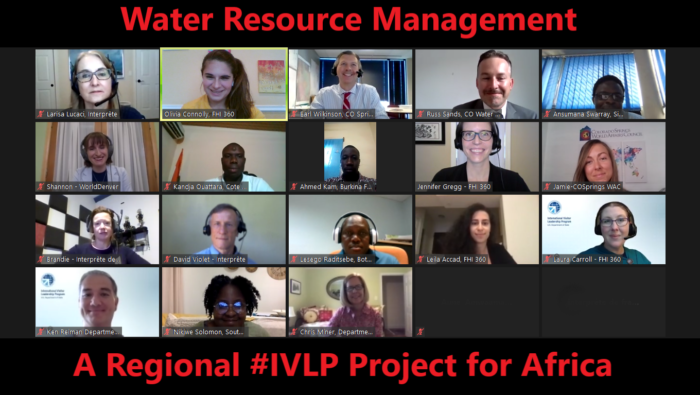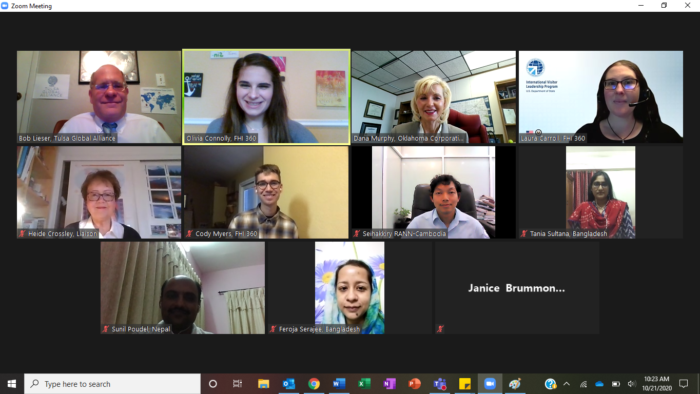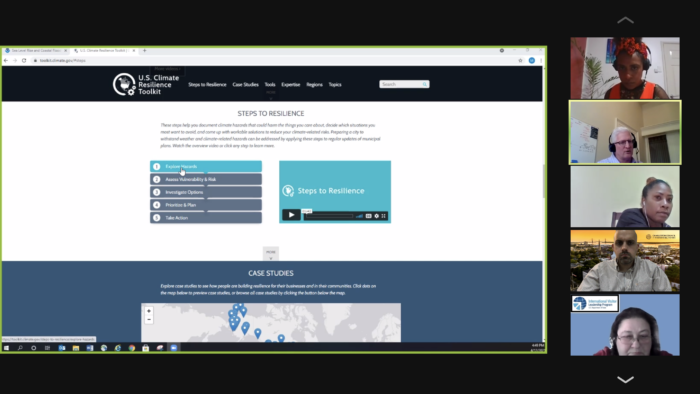Compiled by Skylar Belden, Communications Intern, Global Ties U.S.
International exchange programs like the International Visitor Leadership Program (IVLP) are an opportunity to foster global collaboration. By sharing best practices, exchanging ideas and insights, and building local capacities, the Global Ties Network provides critical opportunities for U.S. and international counterparts to connect, learn, and grow.
We asked our Community-Based Members to share stories and highlights from virtual IVLP projects they’ve hosted on energy and the environment this past year.
Colorado Springs World Affairs Council
Colorado Springs World Affairs Council programed our first virtual International Visitor Leadership Program (IVLP) project back in September 2020, with WorldDenver as cohost. For this project, six African delegates met with two speakers to hear how Colorado is managing water resources during a time of crisis. The Chief Water Services Officer from Colorado Springs Utilities, a four-service utility company providing electricity, natural gas, water, and wastewater services, spoke alongside a representative from Colorado Water Conservation Board. The Board is the state’s most comprehensive water information resource.
This was also the first virtual project for FHI 360’s Program Officer, Jennifer Gregg. We programmers were all a bit unsure what to expect from the online format. A thoughtful plan, clear communication, and defined roles for each participating organization prepared us for a wonderfully impactful, lively, and effective discussion. Everyone was thrilled with the results, even the participants. Jennifer reported after the project closing, “The participants were impressed with how much technical ground they were able to cover in such a short time, which they said was due to the great expertise and knowledge of the excellent speakers. They came from the project with an understanding of the value that Americans put on rigorous science and measurement in water resource management practices, and the extent to which all impacted parties in the community are involved and engaged in water resource management practices. The participants were particularly surprised at how effective the virtual format was. A couple mentioned that they hadn’t really expected much from the virtual experience, but were pleasantly surprised. In fact, this experience encouraged some to begin to promote more virtual interaction within their own organizations.”
We at Colorado Springs World Affairs Council are excited about the possibilities offered by virtual programming and find it wonderful that this new IVLP format is inspiring to others as well. A worldwide pandemic cannot impede the power of exchanges!

Screenshot provided by Colorado Springs World Affairs Council.
Tulsa Global Alliance
In October of 2020, Tulsa Global Alliance (TGA) was asked to host an International Visitor Leadership Project (IVLP) project on “U.S. Energy Policy – Security, Independence, and Innovation” in cooperation with FHI 360. As the former “Oil Capitol of the World,” TGA has often hosted in-person IVLP energy professionals, and we were excited to host this virtual project, our second of 2020. The IVLP participants were government energy officials from Bangladesh, Cambodia, Nepal, and People’s Republic of China.
TGA was asked to focus our meetings on hydraulic fracturing as a source of energy, oil and gas regulation, and oil and gas transportation. The three meetings arranged were with Don Burdick of Olifant Energy, Commissioner Dana Murphy of the Oklahoma Corporation Commission, and Mark Hoffman of Magellan Midstream Partners.
Don Burdick, CEO of Olifant Energy, spoke about how hydraulic fracturing works and how fracking has quickly grown in importance in energy production. He also gave some background on the geology of Oklahoma.
Commissioner Dana Murphy gave an overview of the oil and gas industry in Oklahoma and the role of the Oklahoma Corporation Commission in regulating it. She also said she was pleased and impressed that there were women energy professionals represented among the IVLP participants, and shared her own background in the energy industry.
Mark Hoffman spoke about Magellan Midstream Partners’ oil and gas transportation system, and about the network of crude oil pipelines, refineries, and refined product pipelines throughout the United States. Hoffman and his family had also hosted international visitors for home hospitality dinners and overnight stays, and he spoke about how much he enjoyed hosting and how he had missed it in 2020.
This group was memorable to me for several reasons. In addition to being TGA’s first virtual energy-related project, it was the first involving businesses as professional resources. All three of the professional resources TGA called on for this project had met with IVLP energy professionals in the past, and were eager to meet with TGA’s first virtual IVLP energy project, despite the time difference and the early hour of our meetings. TGA is grateful to Oklahoma’s energy industry for sharing its knowledge and experience with international visitors. We are also thankful to FHI 360 for its advice, support, and rehearsal sessions as we took our first steps into the world of virtual IVLP programming.

Screenshot provided by Tulsa Global Alliance.
Charleston Council for International Visitors
This past month, the Charleston Council for international Visitors (CCIV) hosted a series of virtual International Visitor Leadership Programs (IVLP) with Graduate School USA focused on strengthening climate resiliency of Pacific Island countries through planning, policy, and education.
The Charleston Council for International Visitors arranged a discussion with Susan Lovelace, the Executive Director of S.C. Sea Grant. Sea Grant is part of a national network of federally-supported institutions involved in all three of these areas. Susan familiarized the IVLP participants with the critical work Sea Grant is doing to provide communities with risk assessments and response plans. Charleston also introduced the group to Mark Wilbert, of the Mayor’s Office of Resilience, who walked the IVLP participants through a number of practical tools for resiliency planning, including the Climate Resiliency Planning Toolkit.

Screenshot provided by the Charleston Council for International Visitors.
